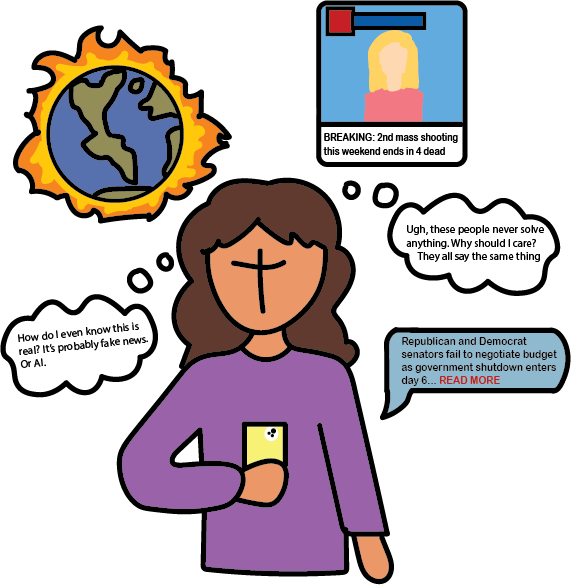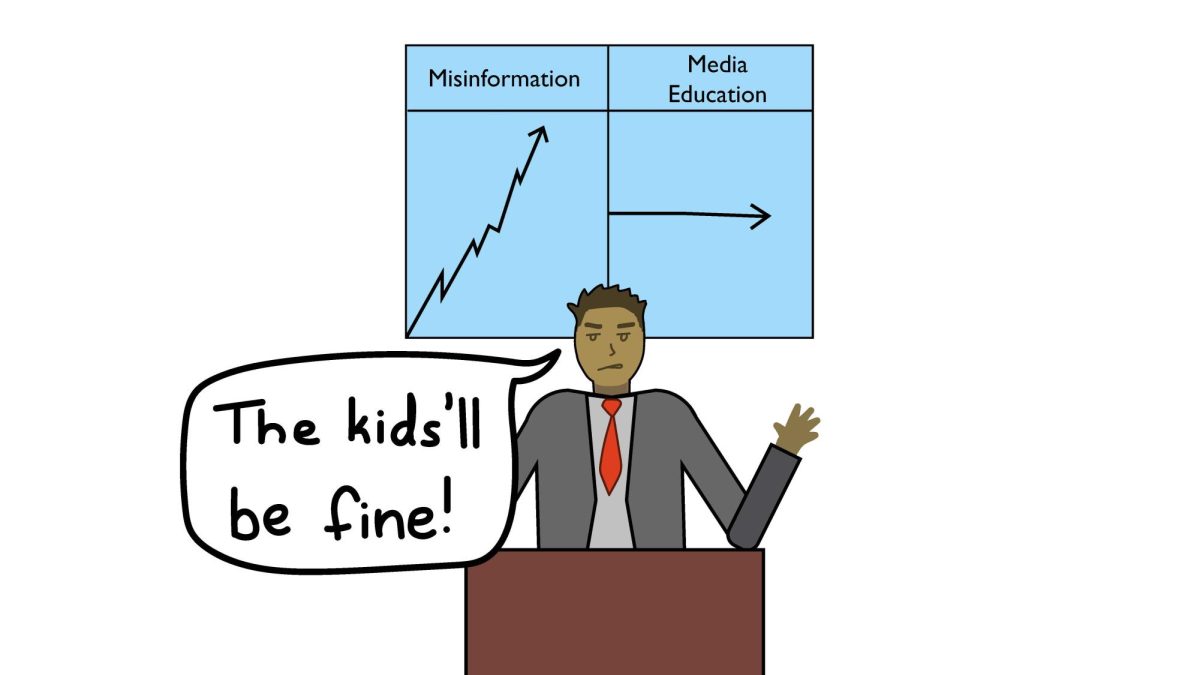Politics are an inescapable part of modern society. The political system in the U.S. is a crucial structure to develop and improve its laws and policies, but it relies on the engagement of its citizens to accurately represent their beliefs, desires and values. However, one particular group of people is often underengaged in politics: young people. Especially in recent years, many adolescents have developed the feeling that being politically engaged is ineffective and fails to represent their concerns.
As a teenager myself, our generation’s disillusionment with politics is understandable. Many of today’s most prominent issues feel fatalistic, and solutions often seem scarce. Climate change is an ever-present problem that only seems to worsen. International wars around the globe show few signs of stopping, and it feels like our government only ever gets more polarized. This month, as we face the tenth major government shutdown since 1976, government dysfunction has been brought into the spotlight.
Social media also plays a huge role in creating teens’ apathy towards these issues. Negative content on social media platforms is twice as likely to be shared compared to positive content. The more controversial a post is, the more views it tends to get, which creates a skewed, disjointed perspective on politics. In a 2022 Statistica survey, 50% of Gen Z respondents said that they used social media daily, and 84% reported that they used social media at least once a month. In comparison, no news category (cable news, network news, local newspapers, etc.) broke 7% daily use. If one’s sole source of information about current events and policies is social media, it seems like a constant stream of dishonesty, misinformation and radical disagreements that feel fundamentally unsolvable.
This causes Gen Z to disconnect from political issues. A study by the civic education nonprofit Civic Nebraska found that 63% of Gen Z members, ages 13-28, are passive regarding American democracy. While they don’t have active discomfort with the system, they are often disengaged, and less than half of them vote. Many feel a sense of complacency or powerlessness when it comes to voting, politics and the democratic process.
The same study found that 31% of youth feel completely detached from politics and see democracy as a failed institution. This group — nearly a third of all youth — is far less likely to participate in civic engagement outside of voting, and they largely match their peers in voter engagement, with 47% choosing to vote. While this disengagement and frustration may seem harmless, it can actually have damaging effects on institutionalized democracy. Youth in this category are more likely to support authoritarianism or political violence, and it risks worsening today’s culture of cutthroat, disrespectful politics.
A common argument against prioritizing teen engagement is the idea that Gen Z lacks the life experience or political knowledge to be effectively involved. In many cases, those critics are actually correct. According to Tufts University, only 24% of 12th graders scored “proficient” on a national civics assessment in 2013. Teens are less likely than adults to check the news regularly or to follow political action, but that doesn’t mean they should be ignored as a constituency. In fact, it means the opposite — schools, community leaders, and political organizations should work to actively engage them in understanding the political environment, because if they don’t, an entire generation will be behind in civic education as they grow into adulthood, and they won’t be able to effectively address issues that impact them.
Decisions made now directly affect teenagers in their day-to-day lives. From education funding to gun violence to traffic laws, youth should be taught that politics are directly involved in what they do. Politics also affect their futures: the way leaders address climate change and the economy now will impact the way we live our adult lives. If teenagers and adolescents are checking out of politics in favor of topics that seem less daunting, they will grow up not knowing the importance of democracy, which could put democratic government in danger. After all, they are only represented if they vote and speak about their viewpoints.
Of course, being up-to-date and involved in politics takes time and energy, and no one needs — or wants — to be thinking about it constantly. But if we don’t solve the epidemic of apathy towards our political climate, we risk losing a lot more than the attention of a few tired teens. Gen Z as a whole has significant voting power, and teens are an important constituency for political leaders. Youth need to understand the important role they play in government.
The solutions to teen apathy toward politics are two-sided. First, teenagers should make an effort to re-engage with politics. Teens should remember that they are not powerless — they can be advocates in political campaigns and activists for political issues, even if they aren’t able to vote yet. They should register to vote, contact their representatives about issues they care about and pay attention to current events. While teenagers don’t need to be constantly monitoring the news, they should stay up to date, especially on political issues that directly affect them, like local political races or educational policy decisions.
Online, it’s extremely important to watch out for misinformation and to remember that social media is not a credible news source. To get a more accurate picture of their typical news sources, teenagers can use the Ad Fontes Media Bias Chart to examine the political bias and credibility of sources. Additionally, tools like Ground News can show blind spots in coverage of political topics. Checkology is a news literacy tool with free education seminars to help students identify misinformation and understand the importance of a free press. Gen Z’s online presence makes it incredibly important for them to understand that social media is not necessarily an accurate representation of any aspect of everyday life, and effective, credible news tools can help broaden that perspective.
On the other hand, much of the responsibility with this youth disengagement in politics lies with the toxic online environment that social media platforms cultivate. Rather than pushing a rhetoric of controversy and polarization, platforms should take care to flag misinformation and promote bipartisanship, collaboration and peaceful compromises. Politicians should target more of their advertising towards younger voters, and they should update local communities to show how they are working across parties to build solutions. Additionally, political organizations that promote youth engagement — such as the Young Democrats or Young Republicans — should actively work to combat apathy and distrust and promote a narrative of collaboration.
Finally, it’s important for teenagers to remember that politics is necessary, but it’s not an ultimatum. The issues that political leaders debate are constantly changing and new solutions evolve all the time. Voting and understanding who leads our nation is part of our civic responsibility, and it’s something that allows democracy to function.










